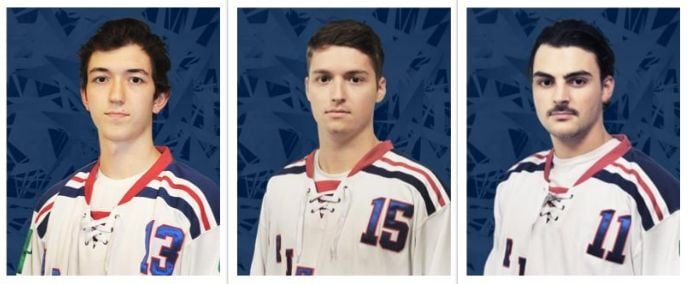This time of the year, the University of Arizona’s club hockey team is typically skating on the ice and bonding in the locker room. Hugging and dog-piling after goals Singing along to Taylor Swift’s “Love Story” after every victory.
In the wake of the COVID-19 pandemic, however, Tucson Arena has gone silent. Coach Chad Berman and his 30 players must wait until January or February for their season to start. While they wait, the Wildcats have been exercising in their backyards, connecting digitally, meeting in small groups and rollerblading.
Their goal: To be ready to push for a national championship in the 2020-21 season. Whenever it happens.
Put on ice
On Feb. 29, the Wildcats beat ASU 3-1 to capture their third consecutive Cactus Cup and were the Western Collegiate Hockey League champions for the second straight year.
Berman called it “my last great emotion” of the season.
“I was hurting my hand smacking the glass,” he said.
Following the team’s win, Queen’s “We Are the Champions” blared throughout the arena as the team skated with the Cactus Cup trophy high above their heads.
The Wildcats were 23-6 and ranked eighth in the nation in March, when all activity on the UA campus was shut down because of the COVID-19 pandemic.
Director of Campus Recreation Troy Vaughn phoned Berman to deliver the news that the hockey season would be ending. He called it distressing and depressing.
On March 12, the American Collegiate Hockey Association canceled its national tournament.
The Wildcats’ final meeting in their locker room was difficult and upsetting. The seniors playing in their final semester shed tears and said some parting words.
“I wanted to fall into a corner and not be seen,” hockey coordinator Tanner Harris said.
The Wildcats left the locker room unsure of when they will return.
New beginnings
In late September, Berman, Harris and team captain Anthony Cusanelli turned the lights back on. The words on the locker-room walls — “Those who stay will be champions” and “Greatness is a daily habit” — were still there. The three men assigned locker stalls for the upcoming season, laid out new workout clothes and hung jerseys — a rite of fall that typically heralds the start of practices.
“I got a chill to see the captain in the locker room,” Berman said, “but it was kind of torture and a tease, a bittersweet mixture of preparing for the worst but hoping for the best.”
On Oct. 16, players returned. They entered the locker room in groups of five or less and held their first outdoor group workout. In the five-plus weeks since then, they’ve been holding socially distanced group workouts at Sitton Field on the UA campus.
It’s a small step toward returning to normal.
“I’m itching to get back on the ice,” Marshall said.
For most players, it’s been eight months.
Marshall, an assistant captain who is from St. Charles, Illinois, spent the Tucson summer working out in his backyard using cinder blocks and bricks. Matthew Hohl, a junior defenseman from Fenton, Missouri, skated about 15 times while home during the summer but has not returned to the ice since July.
Cusanelli, who is from Holmdel, New Jersey, skated exactly once.
Still, all three reported back to the team last month in good shape. Berman provided his players with workout plans and meal suggestions for those who needed to gain or lose weight. Hohl, for example, was able to gain strength and put on 20 pounds.
Players may be happy with their offseason gains, but “nothing compares to conditioning on the ice,” Marshall said.
Training for hockey without being able to skate is difficult. Explosiveness, agility and strength in the hips and legs are critical to being prepared to skate, players said. The best way to build those muscles: skating, which the Wildcats are unable to do as a team.
The team is hoping to skate together sometime in January, when — or if — the ice surface returns to Tucson Arena.
“It is going to be intense and I am excited,” Hohl said, “but I wouldn’t mind seeing a few guys puke.”
‘I wish it was easier’
While they wait, the Wildcats share Snapchat memories of their road trips to remember the good times. They say they miss playing ping-pong, kicking around a soccer ball and blaring music in the locker room.
And the ice? They miss that most of all. It’s where the Wildcats say they’re the most comfortable. Cold air envelopes the rink. Whistles sound. Pucks slam against the boards and skates feverishly crunch on the playing surface.
The Wildcats’ returning players have managed to stay close despite their physical separation. Integrating the incoming freshmen has been a challenge.
As captain, Cusanelli has done what he can to make the new Wildcats feel welcome. It’s hard, however, when there are no social events, pool parties or Topgolf trips to build team chemistry.
“We want to get together, but it’s tougher,” Cusanelli said. “I wish it was easier.”
Hoping for January
Berman is preparing to play a shortened schedule starting in January or early February.
But there’s a pandemic going on, and a return to the ice is not a given.
What is certain, however, is that the Wildcats’ players will have a new appreciation for the sport they love. Hohl said the pandemic has been a reminder of the little things in life that we all may take for granted.
“It is a-you-don’t-know-what-you-have-until-it’s-gone type feeling,” he said. “But when I do play hockey again, I’ll be prepared to go through a wall.”





